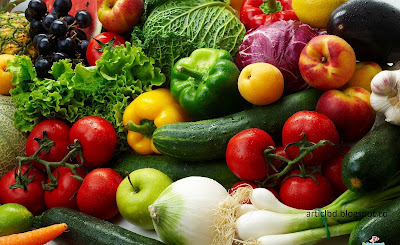Seasonal Vegetable
Spring: Cleaning
It’s ‘spring cleaning’ time! Emerging from a winter when the body is often overloaded, you must regenerate and cleanse your body. It’s time to increase your intake of fruit and vegetables. Artichoke, black radish, fresh onions are good for cleansing the body.
There is a wide choice of vegetables around at this time of year, so choose firm and colourful vegetables, organic, if possible. Avoid vegetables that are too polished to be real and those in a plastic bag. From celery, watercress, mandarin and avocado in April to asparagus, aubergine, cherry and raspberry in June, each month has its discoveries and its pleasures.
Summer: Hydration
In summer, we must stay hydrated, both drinking and ‘eating’ water through our diets. It’s lucky then that cucumbers, courgettes and tomatoes arrive on the shelves in summer. Make your own fruit and vegetable juices or gazpacho (cold tomato and cucumber soup). Apricots, strawberries, peaches, gooseberries, plums, blackberries come into season one after the other, there’s no time to get bored before another fruit is finally ripe!
Summer is also a time for salads, ratatouille and fresh tomato coulis. We eat lighter, we appreciate products ‘as they come’. Fish, fresh cheeses, cold chicken perfectly accompany these deliciously simple cravings.
Autumn: Preparation
The body prepares itself spontaneously and naturally in autumn for the rigours of winter and the short days. It ’craves’ carbohydrates and vegetable fats, but this is not a reason to listen to it!
Some fruits arrive late in the season: quince, walnuts and hazelnuts, damsons, figs, apples and pears. As regards vegetables, the cabbage season starts (recommended for the prostate!), marrow and pumpkins. Do not hesitate to eat cleansing foods (radishes, celery, artichokes), to prepare yourself for the richer winter foods. Think about adding mushrooms into your diet!
Winter: Moderation
In winter, you want hot food: soups, casseroles, and starches. Overuse the first, enjoy the second reasonably, and vary the third (rice, pasta, dried beans, and potatoes). Beetroot, turnips, leeks, onions, carrots, parsnips, potatoes: it is the season of ‘root vegetables’ and stews!
Apples, pears, oranges and oily foods (walnuts, hazelnuts) are with you all winter. And then a mango or guava (excellent for the prostate!) is allowed from time to time.
Hints And Tips
Good For You!
An apple washed with its skin, a banana, a pear, two or three tangerines, plums, or apricots are all good for you. If you want a change and do not have a very sweet tooth try a potato cooked with a little coarse salt or cooked egg white instead of that usual piece of sausage.
Get the Right Cooking Equipment
To better follow the advice given by Feel+, invest in the right cooking equipment such as a non-stick frying pan and an oil spray, which will allow you to cook with minimal fat. Also invest in a pressure cooker that will allow you to control the cooking temperature (many vegetables lose all their nutrients if cooked above 100°C). Invest in good knives for de-fatting meat and slicing vegetables, and a potato masher to avoid flaky potatoes!
Ratatouille
Ratatouille is a classic summer dish but can be eaten all year round. It is good hot or cold and gets better the more it is reheated, so cook a good amount! There are two schools of thought on how best to prepare it: first, is where the vegetables and juices are mixed to cook gently, and second, crispy, where aubergines, courgettes and tomatoes are separately cooked and mixed at the last moment. Whichever method you choose, start with the vegetables that are hardest to cook first: onions and peppers, then garlic, aubergine, courgettes and finally tomatoes. Do not forget to add in herbs such as laurel, thyme and rosemary!
Cabbages And Other ‘Friends’ Of The Prostate
All fruits and vegetables are recommended in large quantities, but some contain antioxidants especially recommended for the prevention of prostate cancer. There are surely some that you like from the examples below:









No comments:
Post a Comment